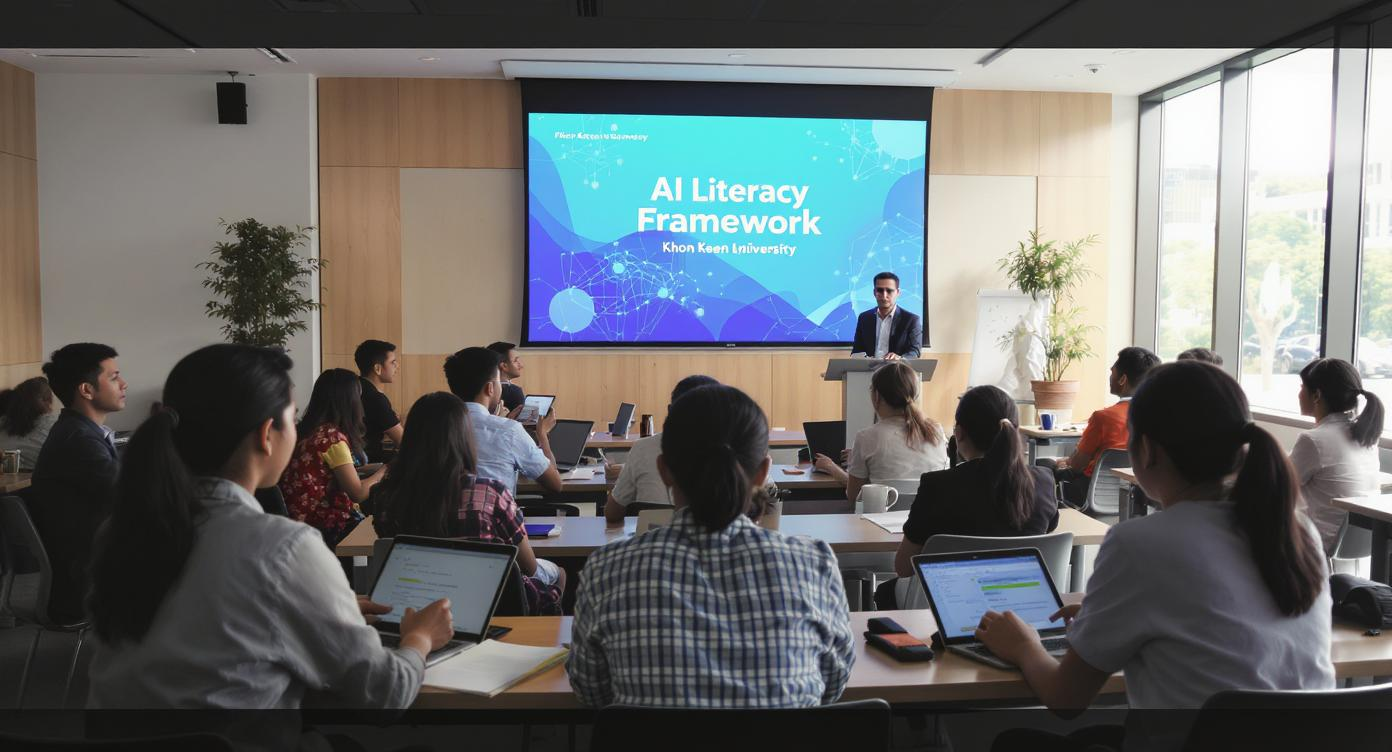
🚀 Empowering Our Students for an AI-Driven Future
The AI Literacy Framework at Khon Kaen University – A comprehensive guide for faculty to integrate artificial intelligence literacy into undergraduate education
🌟 The AI Revolution in Higher Education
Artificial Intelligence is no longer a distant future concept—it’s a transformative force reshaping how we access, process, and apply knowledge across every discipline. As educators at Khon Kaen University, we stand at a critical juncture where traditional digital literacy must evolve into something far more comprehensive: AI Literacy.
The World Economic Forum’s Future of Jobs Report 2025 predicts that AI will transform nearly every industry, fundamentally altering the skill sets required in the global workforce. This isn’t just about learning new tools; it’s about preparing our students to navigate an AI-integrated world with confidence, purpose, and ethical responsibility.
🎯 Understanding AI Literacy: A Global Framework for Local Impact
AI Literacy, as defined by the European Commission (EC) and the Organisation for Economic Co-operation and Development (OECD), represents a blend of knowledge, skills, and attitudes that enable learners to engage with AI responsibly and effectively.
Engaging with AI
Understanding when and how AI exists in everyday tools, and critically evaluating AI outputs.
Creating with AI
Collaborating with AI tools to support problem-solving and creativity while considering ethical implications.
Managing AI’s Actions
Responsibly delegating tasks to AI, setting guidelines, and ensuring human oversight.
Designing AI Solutions
Exploring how AI works and creating or adapting systems to solve real-world problems.
🏆 Five Core Competencies for Undergraduate Success
Technical Proficiency
Effective use of Generative AI tools for various tasks including digital marketing and interactive storytelling. Students should experience diverse GenAI tools such as ChatGPT, Canva AI, Gemini, and others.
Critical Thinking
Evaluating AI-generated content for accuracy, relevance, and limitations. This includes applying GenAI tools to real-world projects and critically interpreting AI-generated content.
Creative Problem-Solving
Applying GenAI to design innovative solutions. Programs should promote iterative learning, reflection, and interdisciplinary approaches to problem-solving.
Ethical Awareness
Understanding critical issues such as data privacy, algorithmic bias, and intellectual property. Clear ethical frameworks and guidelines are essential.
Inclusive Participation
Ensuring equitable participation and supporting students with diverse technical backgrounds through accessible tools and inclusive teaching methods.
📈 Strategic Implementation at Khon Kaen University
Educational Integration
Incorporating AI as an educational tool across all disciplines, including basic AI content in general education courses and promoting hands-on learning.
Faculty Development
Short-term training programs, mentorship programs, and cross-disciplinary integration opportunities for all faculty members.
Ethical Framework
Transparent guidelines, legal compliance, and academic integrity requirements for AI use in research and education.
Culture Building
Awareness campaigns, community engagement, and ongoing AI-related activities to build a supportive learning environment.
🎯 Your Role as an AI Literacy Champion
Familiarize Yourself
Study the five core competencies and understand how they apply to your discipline
Integrate into Curriculum
Start small with basic AI tool introductions and gradually build complexity
Create Safe Environments
Establish “AI Playgrounds” where students can experiment safely
Assess and Evaluate
Use qualitative methods to track skill development and awareness changes
Professional Development
Participate in training programs and stay updated with AI developments
Collaborate
Work with colleagues across disciplines to share best practices
💡 Building an AI-Ready Generation
The Human Skills That Matter Most
While technical AI skills are important, the human skills that AI cannot replicate remain paramount:
- Empathy and emotional intelligence
- Ethical reasoning and moral judgment
- Complex decision-making
- Creative collaboration
- Cultural sensitivity and understanding
Our AI literacy framework integrates these values, promoting a skills-based and ethics-focused approach to AI-era learning that prepares students not just to use AI tools, but to be thoughtful, responsible citizens in an AI-integrated world.
🚀 Join the AI Literacy Movement
The preparation of our students for an AI-driven future is not just the responsibility of technology companies or policymakers—it’s our collective responsibility as educators.
🌟 Shaping the Future Together
The AI Literacy Framework represents more than just an educational initiative—it’s a roadmap for empowering our students with the tools, attitudes, and confidence necessary to thrive in an AI-driven world.
Our graduates will enter a world where AI is ubiquitous. Our responsibility is to ensure they do so as informed, ethical, and capable professionals who can harness AI’s power while maintaining their human values and critical thinking abilities.
The future of education is collaborative—between humans and AI, between disciplines, and between educators committed to preparing students for tomorrow’s challenges. Let’s make that future a reality, starting today.
For more information about AI literacy initiatives at Khon Kaen University, contact your department’s AI liaison or visit our faculty development portal. Together, we’re building an AI-literate academic community that leads by example.
